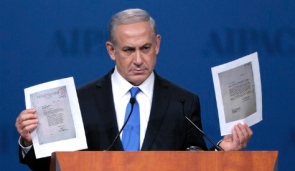UPDATES
Want to avoid a strike on Iran? Then keep threatening to strike Iran
March 16, 2012 | Daniel Meyerowitz-Katz

Israeli Prime Minister Benjamin Netanyahu has recently been the subject of much criticism because of what some see as an unnecessarily militaristic attitude regarding Iran, arguing that his statements indicate a clear gung-ho — even warmongering — attitude. The reality may actually be the very opposite.
Israel is believed to have previously taken-out two different nuclear programs: Iraq’s in 1981 and Syria’s in 2007. I say “believed to have” because Israel has never officially admitted to the second one; indeed, no Israeli public official ever even recognised that Syria had a nuclear program and in neither case was there any prior warning (in fact, prior to the strike on Syria’s secret reactor in 2007, no one even know that a Syrian nuclear program existed). Israeli officials certainly never raised the issue publicly. When Israelis are about to launch such a strike, therefore, the historical precedent is not to announce to the world that they are considering doing so, but to strike suddenly and without warning.
Nevertheless, Israel has in the past been willing to strike when they believed it to be necessary — and both times, the Israelis have been entirely vindicated: there was a huge international outcry against the Israeli strike in 1981, but when Saddam Hussein invaded Kuwait 10 years after his facilities were bombed, there were few people who were not glad that he had no nuclear weapons. Similarly, with today’s turmoil in Syria, that Assad does not have nuclear weapons is certainly something to be grateful for; had he succeeded in his program, his crackdown would be able to continue without any foreign pressure.
So why, then, would Israel be breaking with its previous pattern? Well, In a column for Bloomberg, journalist Jeffrey Goldberg has posited a possible explanation:
But they [Obama and Netanyahu] have accomplished something extraordinary together over the past two years. The sanctions Obama has placed on Iran are some of the toughest ever placed on any country. Even some hardliners now believe that they just might force a change in Iran’s nuclear calculus. And how has Obama convinced the world that these sanctions are necessary? By pointing to Netanyahu and saying, “If you don’t cooperate with me on sanctions, this guy is going to blow up the Middle East.”
Obama’s good-cop routine is then aided immeasurably by the world’s willingness to believe that Netanyahu is the bad cop.
While Goldberg admits that the “game” may not be quite as orchestrated as he implies, there is a very valid point to the argument. As reported by Haaretz journalist Barak Ravid, the continued threat of an Israeli strike on iran does seem to be having its own effect, without any strike having to actually take place (emphasis added):
A top Foreign Ministry official said that the recent rounds of sanctions imposed by the European Union and the U.S. against Iran, along with the fact that states such as Japan and South Korea have joined efforts to pressure Tehran, and also China’s reduction of oil purchases from Iran, bear witness to the international community’s apprehensions about an Israeli military strike. “These aren’t sanctions against Iran. Instead, they are sanctions imposed by the West to curb Israel’s attack plans,” a senior foreign ministry official said. “Had Israel not spoken out about its intention to attack, none of this would be happening. The Iranians are frightened. You have to understand what’s going on there in stores; citizens grab food off the shelves because they are worried about an impending attack. Inflation is soaring and the currency has lost half its value. All this attests to fear.”
The sanctions referred to are finally approaching the “crippling” level advocates of serious action against Iran’s nuclear program have long advocated and are certainly causing economic pain in the country; however, it is important not to discount the effect of the fear of an Israeli strike. Not only does this fear seem galvanise the international community to act where the threats posed by an Iran with nuclear capabilities apparently fall short, but it would also play a very substantial role in any cost-benefit analysis that Iran does when assessing whether it is time to re-assess its nuclear program, and maybe decide that regime survival is more likely without it than with it.
Ironically, Western and Israeli officials arguing that Israel cannot, must not or will not attack Iran may be increasing the odds of an attack by reducing the cost of nuclear weaponisation for the Islamic Republic. What is beyond doubt is that the best way to avoid an attack on Iran is for Iran to abandon its quest for nuclear weapons and abide by its obligations under the Nuclear Non-Proliferation Treaty. The best way to bring about this best-case scenario is most likely to continue to threaten Iran with a credible worst-case scenario.
Daniel Meyerowitz-Katz
Tags: Iran





